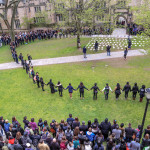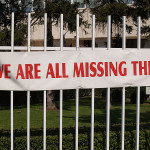In a small office whose disproportionately large windows overlook the parking lot of Yale Health, a soft-spoken therapist tells me, “The nature of the semester…it creates cycles. The break between semesters can wipe away or heal the damages of the semester beforehand. Of course, that also means we are forced to let the good go out to sea as well.”
I am looking out the window, and I do not respond. I’m too busy following a red Volkswagen out of the parking lot, avoiding eye contact with this man who traffics in receiving and making meaning of my pain.
This semester system, in its repetitive cycles of wounding and partial healing, strikes me as ideal conditions for a war of attrition. After two semesters riding out the varied vicissitudes of college life, I can understand some hesitation to put oneself through it again—I can understand why some students might take some time off at the second year mark, and why some students may find themselves never returning at all.
So much of the rhetoric around the sophomore slump is around “beating it,” around controlling the sophomore year. Perhaps because I am fond of the tendency to see grand historical arcs, I sense that, given a sufficient time scale, there is no beating the rhythms of academia. I think of my friends who have departed during their junior, their senior years—I hazard a guess that although it is only “the sophomore slump” to which we give credence as a bona fide phenomenon, the weariness that academic institutions impose on their students is widespread, transcending class year.
In another small room, this one darker, and with smaller windows, my sophomore advisor guides me through confronting the alienation evoked by the wide world of possibility before me. For so much of my first year of college, my concerns were parochial, if existential–limited to the questions of whether I would survive at Yale, whether I would learn to feed myself, drag myself to classes without external motivation, whether or not my grades would reflect some abstract ideal of “being prepared for the rigors of Yale.” These are important questions, but by the second year, they fade into the background as questions that have been answered for the most part.
The questions that face us beyond the first year are both more terrifying and more narrow in scope, forcing us to confront a manufactured sense that college is high-stakes, that the course of study we choose will constrain us forever, that we must be happy, both in the field we study, and in the fields we assume we will be working in. Moreover, barring substantial privilege or good fortune, there is a bare minimum of guidance for answering these questions—our FroCos and Peer Liaisons have fallen away, moving on with their lives. We have an advisor or perhaps a disinterested DUS, and we have the masses of other confused and struggling students who are scratching their heads and trying to figure out the same questions. These figures, barring a particularly compassionate and thoughtful adviser, are no help.
Perhaps this is a manufactured problem. Perhaps it is easy enough, if you have no ethical qualms with the work of the various “political” organizations on campus or with (neo)liberalism in general, and if you think “effective altruism” is an effective means of improving the world—to go through Yale and end up at Goldman Sachs after graduation, without breaking down in your therapist’s office once a week. I wouldn’t know, because I take ethical issue with all of these things, and I break down everywhere—in therapists’ offices, in LC 102, and in the arms of others.
But these questions are haunting—they alienate us at every turn, in part because we think we can find meaning in our work or our study, and college will help us get there. There is some strand of thought we are inevitably indoctrinated into in the course of entering academia, that the discipline we study should provide us some level of interest, that the work we do should compel us, since “if you do what you love, you will never work a day in your life.” I have hardly found that to be the case, sensing instead that if the content of our work does not alienate us, the rhythms that govern work will. Work, as it was born in fields and laundry baskets and factory lines and office cubicles, was never intended to provide for us anything other than a means of making money, of occupying our time.
Perhaps it is true that we can find some measure of work fulfilling—for me, reading and writing and teaching feel like just that—but there is little doubt that the cannibalistic cycles of capital and work and time-discipline have only ever aimed to grow the gross domestic product at the expense of the human soul, treating our bodies as vessels and repositories for labor and capital. It may not be the work that tries to kill you, but the way that work takes root in and control of your body.
Does that sound bleak? Does it sound like the sophomore slump is symptomatic of some greater crisis, one that intersects with a time in our lives when anxieties come to the fore? I think it is not without remedy. These anxieties, in part, stem from the ways in which capital—its pursuit, its accumulation—is centered in our lives, certainly in a neoliberal world at Yale. What I am arguing for is a decentering of capital, and more particularly, a departure from the liberal notion of “finding meaning” in our work, our study, and our lives. As so many cultural anthropologists know, meaning is made, not found. Capital cannot make meaning for us, scattering it in our jobs and our textbooks for us to find. We have to make meaning out of our lives, our relationships to others, our loves of poetry and sex and scientific exploration.
Work may consume eight hours of our day, and ultimately, may consume our health and spirit as well, but with the time we take for ourselves, between work and the rest of our lives, we cannot keep rummaging for some banal and prefab life-meaning. Facing capital and its inescapability under present-day logics doesn’t have to alienate us if it doesn’t matter, if we divorce it from our senses of self and aspiration.
There is some strand of nihilism there, in embracing the notion that work and school hardly matter. Yet, by vacating these symbolic rites of meaning, we create space to center the things that do matter, and the people who can help us make meaning and provide shape to our lives. That eight hours or more of our day should be occupied by a futile race for subsistence does not bar the remaining hours of our days from being fruitful and loving and erotic and significant. In fact, it might be that futility that makes it all the more urgent and compelling for us to find lives on the margins of and in worlds alien to capital.
-Sohum Pal / He can be reached at sohum.pal@yale.edu



